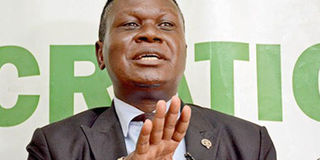Of Makerere and why strikes are a wake-up call for Museveni

Norbert Mao
What you need to know:
- Strong message. By going on strike students, taxi drivers, traders, teachers are sending a strong message to Museveni to change course to avert a worse disaster.
Even those who are not superstitious would agree that President Museveni’s seventh term got off to a bad start. If the violence that punctuated the days leading to his declaration as winner, his controversial inauguration and the spate of killings and the high-handed response to citizen protests is anything to go by, then Museveni should brace himself for more turbulence for the remainder of his tenure at State House.
I foresee a political season filled with unrest rather than peace, acrimony rather than consensus and bitterness rather than contentment. Of course, all this can be avoided if Museveni realises that no major national objective can be achieved without political compromise. Now Makerere University is in the throes of unrest. Students are protesting a tuition hike in a public university.
For their protests they have been subjected to the most brutal force totally disproportionate to any threats their demonstrations pose. There are reports of wanton beatings, shooting at students with live ammunition, break-ins at student residences, rape, and a virtual campus-wide curfew. This highhandedness must be condemned in the strongest terms possible.
But Makerere is but a microcosm of our condition. The whole country is lethargic. Everyone seems to be in a kind of go-slow strike. The source of the unrest, acrimony and bitterness is not hard to find. From the time Museveni assumed office, his signature tune has been the fact that he is neither Amin nor Obote. A very negative attribute if you ask me. He was seen as the calming influence that would help put the anarchy and lawlessness that characterised the Obote and Amin regimes behind.
In the international community Museveni was garlanded for taking a bold stand against HIV/Aids and for liberalising the economy and making it the most laissez-faire of any African economy. For that Museveni received not only aid dollars in sacks but also the least scrutiny of his human rights record. For years donor countries have had a blind spot for Museveni.
But the house of cards is beginning to tumble down. There is no national economy to speak of. The top five players in the five key sectors are not Ugandan.
In fact, the drain of foreign currency from the Ugandan economy is because these foreign players repatriate most of their profits in hard currency virtually unregulated. In economic terms Museveni is a puppet. He is like a music conductor waving the conductor’s staff to a tune he hardly understands or controls. The orchestra is commanded from elsewhere.
Sooner or later signs of discontent would begin to show. It is, therefore, not the public protests and strikes that are causing our economic woes. Neither are they a result of Opposition figures badmouthing the regime abroad. Rather these are but symptoms of fundamental structural problems with the way Museveni has run the country.
Income inequalities have trebled over the years. Agriculture in which Uganda would enjoy comparative advantage has been systematically destroyed by Museveni’s wrong policies. In many cases key government officials are accomplices in the grand racket to disinherit Ugandans. Corruption, greed and incompetence is the sound track of Museveni’s script.
It is for this reason that the majority of Ugandans have resorted to the power of the powerless. By going on strike students, taxi drivers, traders, teachers are sending a strong message to Museveni to change course to avert a worse disaster.
This shouldn’t be seen by the Museveni regime as subversion or economic sabotage. This is a patriotic duty of the highest order. That young citizens are going on strike is a wake-up call to Museveni. He ignores the voices of the students, teachers, taxi drivers and traders at his own peril. Makerere is thus nothing but a tip of the iceberg!




